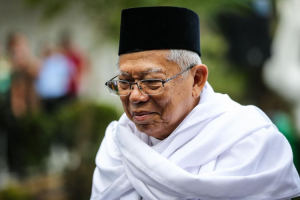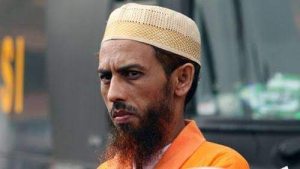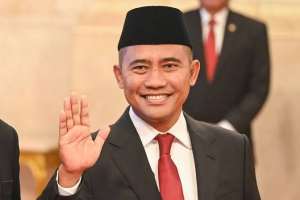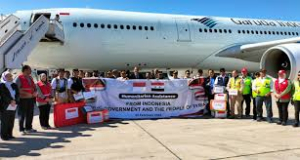Indonesia needs to stay vigilant against online radicalization although IS weakens in Mid-East
The government should remain vigilant against the potential threat to the state ideology, the nation's peace and harmony, despite the decline in online radicalization following the defeat of the Islamic State (IS) in the Middle East and worldwide.
In an era of freedom and social media, Indonesia needs to stay cautious against the virus of radicalism and terrorism, said Comr. Gen. Boy Rafli Amar, Chief of the National Counterterrorism Agency (BNPT). Indonesia has been infected with this ideology by an irresponsible party, he added.
"It is the goal of the transnational ideology to destroy Indonesian culture and noble values. Their goal is to prevent Indonesia from becoming a prosperous and just nation. Therefore, drugs and an ideology incompatible with our nations' customs are systematically used to destroy the nation's value system," he said.
Radicalism ideologies generally promote issues contrary to the state ideology of Pancasila, promote intolerant and exclusive attitudes and justify violence as a means of attaining their goals. "They also incite suicide bombers and justify violence," Amar added.
To counteract online radicalism propaganda, Indonesians must strengthen their state foundation Pancasila and corner the space of online radicalism propaganda. Without discussing Pancasila, other ideologies contrary to it may penetrate Indonesian society and alter its character. Indonesia, as a nation, promotes unity, humanity and religion with tolerance and love for fellow citizens and fellow human beings.
History of online radicalization
Alif Satria, a researcher at the Centre for Strategic and International Studies (CSIS), explained that online radicalization issue began in 2015 and reached its peak in 2017 when IS became very powerful for the first time. There were several types of contents that the terrorist group spread online. The majority of the content focuses on two topics. First, regarding IS' victory on the battlefield, on how it defeated the US, other group, or how it took over Syria.
Secondly, and most importantly, it is essential for IS to demonstrate the process of building a state. They showed their commitment to the Syrian people by building mosques, hospitals and houses. IS' propaganda suggests it was a real caliphate that was active and had a different role than other terrorist groups such as Al-Qaeda.
Due to IS' diminished strength, its content has become monotonous recently. A majority of them refer to their victories on previous battlefields. New phenomena are emerging now, such as the localization of IS content. There is a sense of localization in that they not only laud their victory in Syria but also call for the overthrow of Indonesian President Joko Widodo and the notion that this country is corrupt.
According to Aswin Siregar, a senior police officer at the counterterrorism police unit Special Detachment (Densus) 88, there were hundreds in a day radical contents posted online during its peak. However it is difficult and almost impossible to calculate and identify the number of the accounts that posted the radical contents. There were times, however, when different accounts posted multiple contents, but the contents are identical.
"One day, there may be dozens to hundreds of contents available. Among the contents are messages about end-time prophecy, oppression of Muslims and Islamic groups and the anti-social establishment and anti-government messages. The news can provoke people's emotions, " he added.
Siregar said that all social media platforms contained almost similar amount of radical contents. Generally, IS and other terrorist groups targeted the most popular social media platforms, such as Facebook and Instagram, followed by closed social media platforms, such as Whatsapp and Telegram. Since secure social media is their haven, it is an accessible area for them due to its high privacy. Law enforcement officer is often unable to access these groups and contents.
Exploiting social media
IS and other terrorists groups tend to exploit social media for their radicalization for several reasons.
Satria said that in the first place, online radicalization is much cheaper. At the same time it will be able to reach a much broader audience." IS can demonstrate that it is the most active organization," he said.
In this regard, it is easier logistically since people must be available online in their respective areas compared to offline radicalization. In the context of offline radicalization, would be members should participate in a religious study group for two years. Then, there will be a training session to ensure everything is in order. As a result, it is a costly endeavor in terms of logistics.
Secondly, he pointed out that IS groups in Indonesia, such as JAD (Jamaah Ansharut Daulah), did not actively recruit the people offline. However,they continued to spread their propaganda online, and people would become radicalized and joined them voluntarily.
Thirdly, Satria said online radicalization has broadened the demographics of those susceptible to radicalization. An example of online radicalization is the radicalization of women, who were not permitted to attend mosques at night.
Online radicalization has the advantage that even though women stayed at home, they consumed these radical narratives. Furthermore, it can lead to group radicalization, such as the radicalization of migrant workers, since migrant workers can quickly consume radical narratives.
Siregar said it was impossible to identify which groups that were the most vulnerable to be radicalized online, for example, poor people or people with lower incomes.
"Unfortunately, no. It is not always the case. Consequently, if it is the case, all poor people must have been radicalized," he said.
It may also be people who lack knowledge of religion. As Indonesians, Siregar said there were not many people with high level of education in religion. The rest of Indonesians follow the instructions of the religious teachers (ustads). As a result, it is difficult to identify a group or a category of people who can be radicalized online.
"However, this is part of Special Detachment 88, which monitors people who change their lifestyles. It will not affect them if you give them radical content in the context that they have shown any changes, just like you or any other friends. Despite our efforts, some people have become radicalized, and we cannot determine which group is most likely to be radicalized. We can only say that we must protect all levels of society," Siregar added.
According to Savic Ali, chairman of the Nahdlatul Ulama (NU), Indonesia's most prominent Islamic organization, those susceptible to radicalization usually suffer from personal problems. "Radicalization is easier for some people because they have a problem there personally" he said.
Beside that people who have a history of involvement with radical organizations are vulnerable to be radicalized. Many individuals with a family history of involvement with DI/TII (Darul Islam/Indonesian Islamic Army) and people who have association with DI/TII and Ngruki Islamic boarding schools also are more likely to become radicalized.
Weakening online radicalization
Despite this, Satria said online radicalization has been weakened over the last five years due to the overthrow of IS in Syria. There is, however, an increase in ISIS activity in Africa and areas such as the Maldives. Nevertheless, they do not have access to various propaganda materials that can contribute to radicalization. Furthermore, the Pro-IS group has not conducted many attacks in Indonesia in recent years. As a result, their propaganda materials were reduced.
Ali confirmed that the presence of IS online propaganda is decreasing, and it is becoming increasingly difficult to locate their content compared with seven years ago. Besides the collapse of IS, several other factors have contributed to this outcome.
Among the factors are technological platform applied censorship on the contents. YouTube, for example, applied censorship against contents from groups supporting IS. "Several videos of IS contents were available on YouTube years ago, including a beheading video. However, such contents do not exist anymore, everything has been removed," said Ali.
It also happens on Twitter. It is estimated that Twitter deleted hundreds of thousands of accounts associated with IS between 2014 and 2016. Facebook and Instagram did the same. Their presence in open social media has declined significantly, assuming that Facebook, Twitter, and Instagram are the standard. "Nevertheless, I am unsure what is going on on another closed platform," Ali said.
Combating online radicalization
For NU, it is a must to fight against online radicalization. Ali said NU did not wish to see the life of the Indonesian nation and state fall into violence. In a country where IS and Al-Qaeda have a strong presence, the government is ravaged by violence because they only speak one language that is violence.
The second reason is that NU does not wish that such a group becomes more robust in representing the religion of Islam. Since the emergence of Al-Qaeda and IS, the West and those who do not understand Islam viewed Islam as IS and Al-Qaeda.
IS and Al-Qaeda constitute a small minority. However, they have routine and frequent actions that make them newsworthy. People who are unfamiliar with Islam will likely perceive Islam as IS and Al-Qaeda. "Certainly not. In our capacity as Muslims, we do not wish to see Islam represented by groups that are not representative of Islam. Salvation and peace are the hallmarks of Islam," Ali said.
In combating online radicalization, NU primarily aims to propagate its ideology, which is Islam, accepts democracy and Pancasila as the state ideology, so that more people will receive NU's perspective, tradition and Pancasila as the state ideology. Automatically, they will have no idea whether to fight against the state due to their acceptance of democracy. They will have no idea how to establish an Islamic State.
Additionally, NU adheres to the ideals of tawasul (compromise), tawajun (balance) and proportionality. NU has a strong interest in ensuring its ideology is dominant. NU's Islamic perspective enables Muslims in Indonesia to be moderate, tolerant and coexist in harmony with people of other faiths and ethnic groups. As a pluralistic society, Indonesia is, in fact, a multicultural society.
"There will be a problem if Muslims cannot live together with other people. It is worth noting that extreme and ultra-conservative groups always instill an ideology that makes it difficult for people to live together, " he added.
To promote NU ideology online, NU promotes moderate Islamic clerics to preach and spread their sermon and ideology online. For example, the most famous cleric of the NU movement, Gus Baha is an NU cleric. Many individuals are similar to Gus Baha. "NU clerics have a systematic study of Islam on an offline basis. Several NU clerics have shared their views on social media regarding NU's style of Islamic interpretation," Ali said.
Duty of Densus 88
For Siregar, there are several efforts are being made to combat online radicalization. Densus 88 has a separate directorates to combat online propaganda of the terrorist group. Among the directorates are the prevention directorate, the identification, social directorate, and intelligence directorate. They are responsible for most of the activities. "Still, the prevention directorate of Special Detachment 88 is in charge of most of them," he said.
For example, the prevention directorate works together to establish communication with groups in society, congregations and the general public. In response to radical content spread online, the directorate assist them in identifying radicalism, terrorism and intolerant content and then provide a counter-narrative.
The prevention directorate of Densus 88 distribute or disseminate content on nationalism, patriotism, nationalism and moderation, which it believes can be protective and can counter and combat online radicalization.
If the prevention directorate of Densus 88 has identified online radical contents, it would then collaborate with other stakeholders, such as the Ministry of Communication and Information Technology, telecommunications providers, internet service providers, content providers, etc. Those stakeholder will provide specific algorithms for filtering content and postings in their place or for filtering content and postings distributed among the public.
"The communication ministry has the authority over this matter. Special Detachment 88 provides us with reports or information that we wish to be removed. The Special Detachment is not responsible for removing the contents. It is not under our control. Densus 88 does not have the authority to remove something [an account], " he added.
Already have an account? Sign In
-
Start reading
Freemium
-
Monthly Subscription
30% OFF$26.03
$37.19/MonthCancel anytime
This offer is open to all new subscribers!
Subscribe now -
Yearly Subscription
33% OFF$228.13
$340.5/YearCancel anytime
This offer is open to all new subscribers!
Subscribe now






